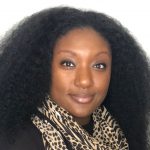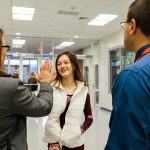In the wake of the COVID-19 outbreak, unemployment rates in the U.S. rose to their highest level since the Great Depression as of mid-April. In the past week alone, the U.S. Department of Labor reported more than 1.4 million new unemployment claims.
Diandra J. Prescod, associate professor and program coordinator of counselor education and counseling psychology at the Neag School, is working to combat the obstacles faced by those Americans who have lost their jobs or been furloughed as a result of the pandemic. She wants them, first and foremost, to have hope.
“In my work as a researcher,” says LLEP doctoral candidate Pauline Batista ’16 MA, “I come from an understanding where youth do not have a voice unless youth have the educational skill set or the educational apparatus.”
“During the pandemic, I saw teachers from across the world sharing their students’ works similar to a collaboration between students from Purdue University and the University of Connecticut I led three years earlier,” says Christopher Cayari, assistant professor of music at Purdue University. “My students at Purdue were ecstatic to see their ukulele-playing tests turned into a music video featuring their virtual friends hundreds of miles away.”
Interview with Dr. Jeremy Landa, UConn researcher and specialist in education and discrimination in minority communities. Topic: Disparity in Connecticut’s Education System.
Schools play a critical role in fostering emotional safety for adults and students. In responding to COVID-19, schools planning to reopen must include efforts that define a safe school environment as having not only physical elements such as cleaning practices, ventilation conditions, and physical distancing protocols, but also emotional elements.
“That grammatical pause helps explain how racism can grow, even thrive, generations after slavery ended. It is the jump ball where the referee throws the ball slightly to one side, sometimes intentionally. It is the fastball on the edge of the strike zone where the right call is blurred so completely that bias is all that is left to decide whether it is a ball or strike,” says Doug Glanville, a faculty member in sport management at the Neag School of Education.
Amit Savkar, who started working at UConn in 2007, was in charge of the math department’s online programs in 2013 when he was tasked with figuring out what was leading to high rates of failures and withdrawals in first-year math courses. He looked into things like how students’ math skills are assessed, and how pupils are placed in basic to advanced courses.
Cutting across all this work is equity. Connecticut, like much of the country, is more diverse than it once was. To help ensure equal educational opportunity for all its students, UCAPP hopes to train principals to spot inequities and negotiate thorny social issues to help resolve them. It has therefore worked to infuse equity into its curriculum and create space for groups education systems often overlook.
With so many interests shaping its principal preparation program, how well is UCAPP addressing the needs of its students, who many consider UCAPP’s primary stakeholders? UCAPP connected the Wallace editorial team with four members of its class of 2021, the first class to train in the current iteration of the program, so we could seek out their views about the new program.
In the wake of the pandemic, schools have pivoted to online learning. Rachael Gabriel, associate professor of literacy education and director of Neag School of Education’s Reading and Language Arts Center, knew she wanted to help the education community amid this major shift.




